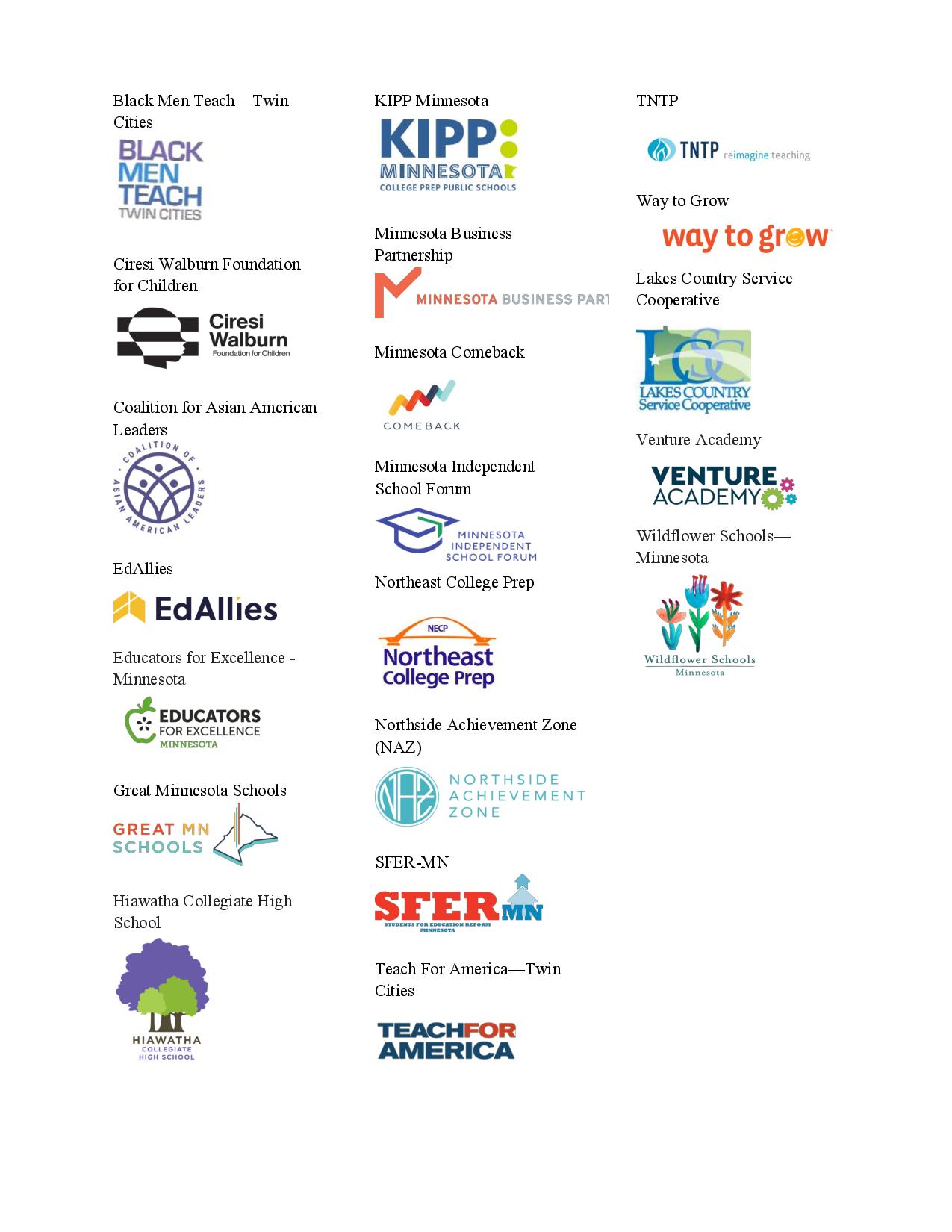March 12, 2019
Strong Coalition of Organizations Urge Minnesota Lawmakers to Reject Harmful Teacher Licensure Bills
Governor Tim Walz
130 State Capitol
75 Rev Dr. Martin Luther King Jr. Blvd.
St. Paul, MN 55155
Sen. Carla J. Nelson, Chair, Senate E-12 Finance & Policy
3235 Minnesota Senate Building
St. Paul, MN 55155
Rep. Cheryl Youakim, Chair, House Education Policy Committee
591 State Office Building
St. Paul, MN 55155
cc: Members of the Senate E-12 Finance and Policy and House Education Policy Committees
Dear Governor Walz, Senator Nelson, and Representative Youakim:
We are writing today as a diverse group of organizations—including schools, associations, service providers, community groups, and advocates—to express strong concerns with HF 1329/ SF 1557. This bill would place unnecessary hurdles between great teachers and Minnesota classrooms, failing to acknowledge the many skills, experiences, and pathways that can make a teacher great. It would push high-quality teachers out of the profession at a time when many Minnesota schools and districts are struggling to staff their classrooms, and would have an especially devastating impact on career and technical education teachers and teachers of color.
Minnesota teachers deserve a straightforward and fair licensure system. For too long, they faced a system that the Office of the Legislative Auditor called “broken.” Over the last several years, through compromise and hard work, state leaders thoughtfully replaced that broken system with a new tiered structure, which just went into effect last fall. Doing away with bureaucratic and arbitrary rules, tiered licensure acknowledges the many factors that can make an educator effective: their teaching experience, their content knowledge, their training and professional development, and, most importantly, their impact on students.
We all share the priority of having an excellent teacher in every Minnesota classroom. We believe that teacher licensure sets an important baseline; from there, we must trust school leaders to make the best decisions possible to fill school needs and advance the well-being of students. The current system grants school leaders the flexibility to bring great educators into the classroom from diverse backgrounds and experiences. HF 1329/SF 1557 would swing the pendulum far in the other direction, eliminating many high-quality teachers from the pool and making the licensure system more restrictive than ever before.
A few of the most significant problems with the bill include:
- Preventing a student from being placed with a Tier 1 or 2 teacher two years in a row. In addition to labeling these teachers as ineffective, even when there may be evidence to the contrary, this would create a logistical nightmare for schools that offer residency-style preparation programs or employ content experts to deliver unique programming.
- Restricting Tier 2 license to candidates enrolled in teacher preparation, removing the nontraditional pathways that the tier was created to foster. Candidates with master’s degrees, content expertise, out-of-state training, and other qualifications— including teachers already making an impact in the classroom—would be forced to enroll in teacher prep or leave teaching altogether.
- Increase bureaucracy by severely limiting the number of renewals available to Tier 1 teachers. As the Professional Licensure and Standards Board recently reported, it is extremely rare for the Board to deny good cause renewals. Tier 1 teachers almost universally have legitimate reasons to be in the classrooms they serve. Arbitrarily capping renewals forces schools to jump through unnecessary hoops while decreasing job security for their Tier 1 teachers.
- Eliminating the pathway to permanent licensure for teachers coming from non-traditional pathways, regardless of their experience and demonstrable effectiveness. Once we identify a great teacher, we should support their talent—not push them out.
- Sending the message that teacher effectiveness does not matter by removing the requirement that a teacher have a successful evaluation before moving from Tier 3 to 4.
We urge our elected leaders to think carefully about the impacts of this bill, particularly on teacher diversity. The data is clear: because they are significantly more likely to hold a Tier 1 or 2 license, this bill could impact 23 percent of current teachers of color. By mandating a one-size-fits-all path to teaching, HF 1329/SF 1557 would move us back to a status quo that for too long has not worked, and that fed into our teacher diversity crisis in the first place. Between high tuition, unpaid student teaching, and too often a lack of cultural competence, there are significant barriers to successful completion of traditional teacher preparation—all that while we know there are mixed outcomes. Minnesota must ultimately focus on impact rather than inputs, welcoming talented educators to the field through multiple pathways, not demanding that they all jump through the same hoops—especially when those hoops have historically been a barrier to the classroom for talented educators of color.
Finally, we urge you to consider the dire impact this bill would have on the entire field of career and technical education. Not only could this legislation push out nearly half of the state’s CTE teachers, schools could be forced to scale back on course offerings and limit options that are currently preparing students for college and career. This would have a direct, and devastating, impact on students and the Minnesota economy.
HF 1329/SF 1557 would be a huge step in the wrong direction, with significant repercussions for schools, teachers, and the students they serve. We urge our state leaders not to advance this bill.
Sincerely,

Currently Reading
Strong Coalition of Organizations Urge Minnesota Lawmakers to Reject Harmful Teacher Licensure Bills